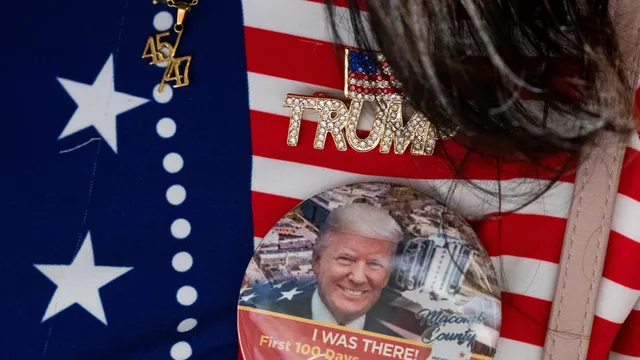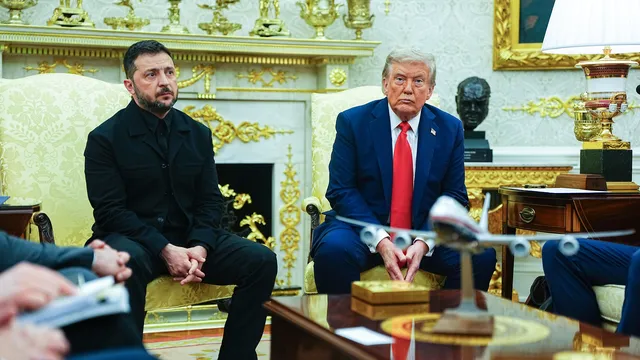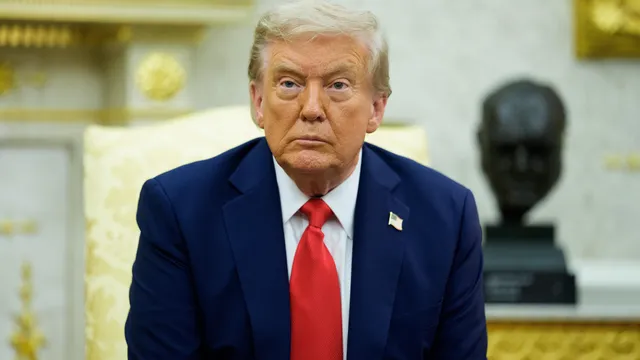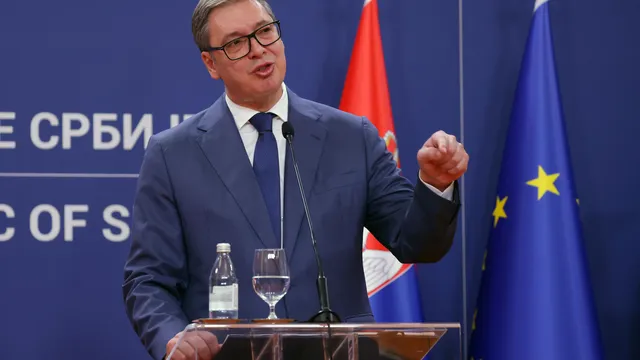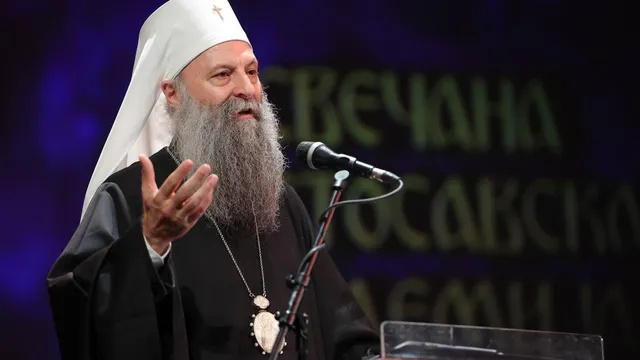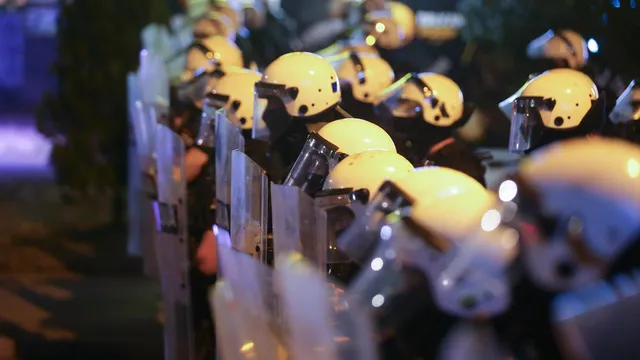In the three months since his inauguration, the 47th president has wielded his power in a manner comparable to few of his predecessors. With stacks of documents signed with the presidential pen and policy statements posted in all caps on social media, his flurry of executive orders has reached every corner of American life.
For his supporters, this "shock and awe" approach is a tangible demonstration of a president in action, delivering on his promises and introducing long-awaited reforms. His critics fear that he is causing irreparable damage to the country and overstepping his authority—paralyzing important government functions and perhaps permanently changing the presidency in the process.
The six turning points of the first 100 days
A social media post sparked a constitutional storm
This time, it wasn't a Donald Trump post that sparked public outrage. Three weeks into the new term, at 10:13 a.m. on Sunday morning, Vice President J.D. Vance wrote nine words that became the basis of the administration's strategy:
"Judges have no right to control the legitimate power of the executive branch," he said on X (formerly Twitter).
A storm erupted in the media, and legal experts immediately opposed this claim, citing a 220-year-old principle that is at the heart of American democracy: courts have the right to review and overturn government actions — laws, regulations, and executive orders — if they violate the US Constitution.
Vance's words were an open attack on the judiciary and, more broadly, on the system of three equal branches of government created by the founders of the United States.
Trump and his team showed no remorse in their quest to expand the executive branch's influence over Congress and the judiciary.
The White House has acted aggressively to wrest control of government spending from Congress, unilaterally cutting funding for entire programs and even agencies. This undermining of the legislative branch has been met with almost complete silence on Capitol Hill, where Trump's Republicans hold fragile majorities in both chambers.
The courts, however, have put up stronger resistance—more than 100 court rulings have so far blocked presidential actions, declaring them unconstitutional, according to a New York Times tally.
The most heated conflicts have been over repressive measures against immigration. In March, more than 200 Venezuelans deemed a threat to US security were deported to El Salvador, many of them under expanded wartime powers and without a chance to defend themselves in court.
A Republican-appointed federal appeals court judge said he was "shocked" by the White House's actions.
"The authorities are now so close to a clash that it could lead to an irreversible conflict that would weaken them both," wrote Judge J. Harvey Wilkinson.
Trump and his administration officials have assured that they will comply with court rulings, even when the president sharply criticizes judges and, in some cases, delays full implementation of rulings. All of this represents a unique test for a constitutional system that has functioned for centuries on the basis of a certain level of good faith. And while Trump is at the center of this transformation, one of the main agents of change is a man who was not born in the United States but built a business empire there...
With a chainsaw, dressed in black
Elon Musk, dressed entirely in black and wearing sunglasses, stood center stage and basked in the cheers of the audience at the Conservative Political Action Conference (CPAC).
The richest man in the world, who wants to cut trillions of dollars from the federal government, announced that he had a special surprise.
Argentine President Javier Milei, known for his massive budget cuts, came out from behind the scenes and handed him a shiny gold chain saw.
"This is the bureaucracy cutter," Musk exclaimed. "CHAINSAW!!"
It was a dramatic demonstration not only of Musk's enthusiasm for his mission at the helm of the new "Department of Management Efficiency" (Doge), but also of his rock star status among Trump supporters.
Since then, Musk has dispatched his agents to various corners of the federal administration to gain access to sensitive databases and identify programs for elimination.
Although he never found the trillions of dollars in waste he promised to save, the cuts he made led to drastic downsizing of dozens of agencies and departments — including the virtual closure of the US Agency for International Development (USAID) and an attempt to dismantle the Department of Education.
Although promises to eliminate "waste, fraud, and abuse" in government are generally well received by the public, Musk's chainsaw-like methods have led to conflicts with senior officials and outrage among some Americans.
Some Trump supporters back the administration's aggressive budget policy, but other citizens are complaining to their representatives at public meetings.
Boos and alarm are heard more and more often – people fear that the cuts will affect popular programs such as Social Security pensions, veterans' benefits, and health insurance for the poor and elderly. These fears are not unfounded, as these programs make up the bulk of federal spending.
If they are not cut, while at the same time Trump's promised massive tax cuts are implemented, this will further increase the national debt and jeopardize perhaps his biggest campaign promise – economic prosperity.
"I had to act fast, billions were disappearing before my eyes."
When trader Richard McDonald saw Donald Trump holding up charts in the White House Rose Garden showing a list of countries subject to US tariffs, he realized he had to act fast. "I jumped up because I was expecting a verbal statement, not charts," he said.
McDonald had expected tariffs of 10% or 20%, but today he says, "No one expected these huge numbers."
McDonald rushed to analyze which companies would be most affected. Then he started selling. "Billions were evaporating from market value every second, so it was a matter of quick fingers." He is just one of many traders who found themselves on the front line of global markets when stocks plummeted after Trump's so-called "Freedom Day" — the day he announced the new tariffs.
The S&P 500 index, which covers the largest US companies, was particularly hard hit. Although the White House subsequently backed down on some of the highest tariffs, markets have yet to fully recover. The economy was a major issue for voters in the November elections, and Trump was able to ride the wave of discontent with inflation under Biden to secure victory. His promises to lower prices, reduce regulations, and revive American manufacturing were warmly welcomed by Wall Street and many working Americans. But in his attempt to deliver on those promises through new tariffs, the economic consequences have become painfully apparent—at least in the short term: The stock market has plummeted
Interest rates rose, including for mortgages; consumer confidence fell; unemployment rose, partly because of a wave of federal layoffs; the Federal Reserve, along with many economic experts, warned that Trump's plans would slow growth and could lead to a recession.
Although Trump's approval rating for his handling of the economy is falling, many of his supporters remain loyal. In former industrial regions devastated by the loss of manufacturing jobs, people still believe in tariffs as a chance for a more equitable global economy.
"Trump has brought respect back to America," says truck driver Ben Maurer of Pennsylvania, referring to tariffs on Chinese goods. "We are still a force to be reckoned with."
Tightening immigration policy... Recognized in a photo – "My son, shackled in prison"
"That's him! That's him! I recognize his features!" cries Mirelis Casique Lopez, pointing to a photo of shackled men kneeling on the floor of one of the world's most notorious prisons. She is at her home in Maracay, Venezuela, when a BBC reporter shows her the photo published online by the authorities in El Salvador – a photograph taken from above showing a sea of shaven heads, with men in white T-shirts lined up in long straight rows.
Her last contact with her son was when he was in the US awaiting deportation back to Venezuela. Now, however, he was 2,300 kilometers away, in a notorious prison in El Salvador. He is one of 238 Venezuelans deported by the Trump administration.
The White House claims that these men are members of Tren de Aragua, a powerful multinational criminal organization. Cassique, however, insists that her son is innocent. Strict immigration measures were a key part of Trump's election platform, and he is now using all his power to fulfill his promise. Illegal border crossings began to decline at the end of Biden's term, but are now at their lowest level in over four years.
According to opinion polls, most Americans approve of the strict measures, but the deportation campaign is having a chilling effect on immigrant communities and has even affected students and legal citizens. Some permanent residents and students who came from abroad were detained and faced deportation for participating in pro-Palestinian protests at universities. They strongly deny allegations that they support the terrorist group Hamas.
Civil rights lawyers warn that in some cases deportations are being carried out without trial, with innocent people being "swept up" alongside "killers and criminals," as Trump has called them.
Although the scale of mass deportations has not yet been reached, as some had hoped and others feared, newly appointed immigration officials are conducting operations across the country—in businesses, homes, churches, and universities.
Academic freedom under threat
When Harvard President Alan Garber decided to openly oppose the White House, he not only defended the university's independence, but also sent a powerful signal to all academic institutions in the US. On April 21, he announced that he would file a lawsuit against the government over Trump's decision to freeze billions of dollars in federal grants.
Garber said this was not only illegal but also an illegitimate attempt to control the work of higher education institutions, which are supposed to be a sanctuary of autonomy. Trump and his advisers justified their actions by claiming that universities such as Harvard were failing to address anti-Semitic incidents on their campuses—specifically, that they had not done enough to prevent anti-Semitism among students. Garber responded, however, that the university had taken steps to address the problem and that the accusations were unfounded. This was only the most visible manifestation of Trump's broad attack on higher education, which was activated with the support of his supporters and due to protests at universities related to the Palestinian issue and student protests in support of Palestine in 2024.
The president and his advisers see universities as promoting a very liberal ideology, which they believe is being imposed on students and academics. They say that these institutions do not reflect the true values of American culture, but rather seem inclined to support extreme left-wing perceptions and social attitudes, which are contrary to traditional American understandings.
As a result, the Trump administration began using financial measures as a tool to pressure academic institutions. They froze federal grants for universities that did not comply with their requirements on anti-Semitism and liberal ideologies. They threatened to withdraw funding from universities that did not comply with their policy of reducing "political correctness" and exercising stricter control over ideological guidelines on campuses. In addition to the attack on academic institutions, the White House also imposed regulations restricting protests and Middle East studies programs at universities due to the escalating situation with highly politicized student actions regarding Israel and Palestine.
Columbia University in New York was one of the first to capitulate to the White House, agreeing to change some of its policies—including easing protest rules, changes to campus security, and even reworking its Middle East curriculum, which the White House deemed too favorable to the Palestinians.
Trump used the threat of terminating federal contracts as a tactic to pressure law firms and corporations into hiring and representing more conservative lawyers and experts. Several law firms have agreed to the government's terms, offering millions of dollars in free legal services to the administration, while others have filed lawsuits challenging the constitutionality of the penalties Trump is imposing. Trump's attacks are not limited to universities and law firms, but also affect the media industry. For example, the lawsuit Trump filed against ABC News ended with the media corporation being forced to pay $15 million to Trump's presidential foundation.
CBS is also in the process of negotiating a settlement of a lawsuit related to an interview with Kamala Harris, and a CBS company is currently in talks with federal authorities for approval of its merger with Skydance Media.
This situation with universities also highlights the rise of government control over academic freedom and the growing use of financial threats and pressure as a means of shaping the country's ideological direction. The future of academic independence and university autonomy appears to be under serious threat.
Deleting "equality and identity" policies
A White House press conference began with a minute of silence in memory of the victims of a plane crash.
Within seconds of the pause ending, Trump launched his attack. The president said that an initiative for "diversity" at the Federal Aviation Agency was partly to blame for the tragedy, as it had hired people with severe intellectual disabilities as air traffic controllers. The president provided no evidence for his claims.
It was a shocking moment that encapsulated the attack his presidency has launched against "inclusivity" programs that have grown in recent years in the US government and the corporate world.
Trump has ordered the federal government to end diversity and equality (DEI) programs and investigate private companies and academic institutions deemed to be participating in "illegal DEI." His directive has accelerated the moves by leading global companies such as Meta and Goldman to reduce or eliminate these programs. First introduced in the 1960s after civil rights victories, early forms of DEI sought to expand opportunities for Black Americans. They later expanded to include women, LGBT rights, and other racial groups. Efforts were intensified and embraced by much of corporate America after the Black Lives Matter protests in 2020 following the death of George Floyd at the hands of Minneapolis police officers. But for critics, DEI placed politics and race above talent, created division, and is no longer necessary in modern America.
Trump's directive appears to have support from some voters, but others strongly disagree. The National Cemetery in Arlington removed all references to the history of Black and female service members from its website. And the Enola Gay, the plane that dropped the atomic bomb on Japan, was initially threatened with removal from Pentagon records, apparently because of the word "gay."
Donald Trump's first 100 days have been an unprecedented demonstration of unilateral power exercised by a modern American president. His efforts to dismantle large parts of the federal government will take years, if not decades, to be restored by subsequent presidents — if they so desire. However, Trump's efforts so far may prove ineffective. Without new laws passed by Congress, many of his sweeping reforms could be "unwritten" by a future president.
So, the extent to which this turbulent start leads to lasting change remains an open question. Later this year, Republican majorities in Congress will try to provide legislative support for Trump's agenda, but their success is far from guaranteed. And in next year's congressional elections, those majorities could be replaced by hostile Democrats determined to investigate the administration and limit its power.
Meanwhile, more court battles are expected—and while the US Supreme Court has a conservative tilt, its rulings on a number of key cases could ultimately derail Trump's efforts.
The first 100 days of Trump's second term have been a dramatic show of political force, but the next 1,361 will be the real test of whether he can leave a lasting legacy. | BGNES
---
Anthony Zurcher and Tom Geoghegan, BBC

 Breaking news
Breaking news
 Europe
Europe
 Bulgaria
Bulgaria
